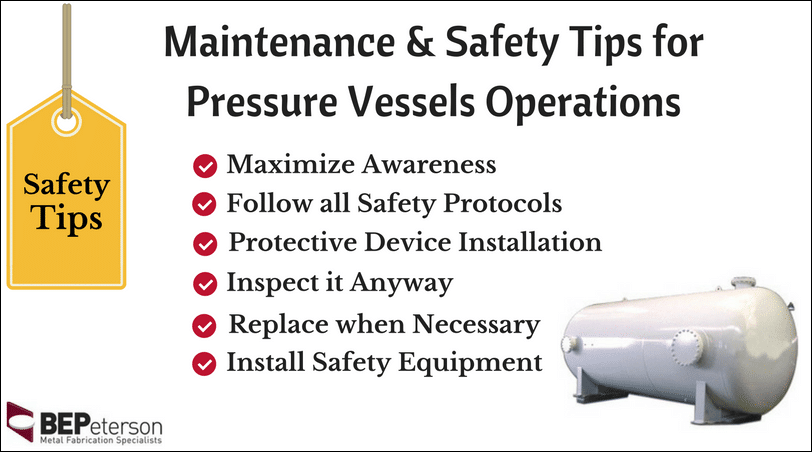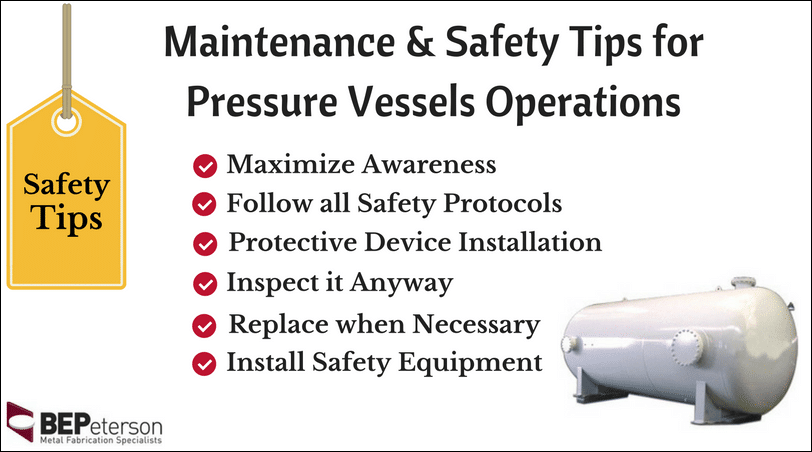Pressure vessels are specially designed to hold and operate at pressures above 15 pounds per square inch gauge. Pressure vessels with large volumes are vital components of a range of manufacturing applications. The contents of pressure vessels are at substantially different pressures than the ambient pressure. If this pressure is not maintained properly, it can be very dangerous and lead to fatal accidents. Thorough care needs to be taken to avoid such accidents.
What Safety Precautions Should One Consider While Working with Pressure Vessels?
For safe operation of pressure vessels, they need to be handled with utmost care and certain precautions. What are these precautions?

Pressure Vessel Maintenance & Safety Tips You Need to Follow
All the safety precautions and maintenance tips described below need to be observed to avoid harm and tragedy when using pressure vessels.
1. Maximize Awareness
It is difficult to maintain a safe working environment if employees do not have an adequate understanding of the risks in your environment. The person operating or handling pressure vessels should have a proper skill set, as well as knowledge about the equipment. Necessary training must be given to those who are responsible for repairing, maintaining, installing, or checking the pressure of the equipment. You cannot afford to let a person of little knowledge about the equipment handle it, for obvious reasons.
2. Follow All Safety Protocols
Extra attention should be given during the maintenance cycle to ensure that all rules and protocols are followed. This takes into account the execution of follow up measures at the completion of the cycle. Furthermore, throughout the maintenance cycle, it is necessary to inspect and test all safety features of the equipment to ensure they are also in operational order.
3. Protective Device Installation
Installing protective devices helps ensure that the pressure vessel meets the challenges of daily use. Installing a valve shield, building a secure base, and ensuring that all metal surfaces are covered with the appropriate coating are all key protective steps.
4. Inspect It Anyway
It is essential for all pressure vessels to undergo inspection. Each inspection should be as systematic as possible. Even if the pressure vessel was just inspected, inspect it again. Pressure vessels function under dynamic conditions and loads. So, even if the previous inspection did not show any concerns, the situation may have changed.
5. Replace When Necessary
Pumps, valves, and other equipment that are connected should always go through periodic inspection to identify potential concerns. Some industries follow a “replace when needed”, whereas some follow a “replace when necessary” maintenance program. Initially, the difference might appear academic between the two types. Nevertheless, “replace when needed” program lets wear to exceed 75 percent before replacing the part, while a “replace when necessary” allows wear to be only 50 percent.
6. Install Safety Equipment
When it comes to taking precautions for pressure vessels, you need to ensure that suitable protective devices are installed, and adjusted to the correct settings. These protective devices can be safety valves or any device that shuts down the operation when the temperature or pressure exceeds the maximum value. You can also opt for warning devices, which send out signals by lighting or sound so that it grabs your attention. It is also necessary to keep these protective devices in good working condition, only then you can expect their proper functioning. One thing should always be followed – the protective devices should only be operated or altered by an authorized person.
All the pressure vessel safety precautions mentioned and discussed above are very important and you cannot afford to overlook them. One small mistake can lead to a huge loss. Therefore, it is always recommended to get help from experts and check whether the pressure vessels installed in the industry are at safe pressure. Also, you should buy pressure vessels from trusted and well-known manufacturers, who do not compromise on the quality of their equipment. BEPeterson is an industry expert using advanced manufacturing techniques to deliver quality pressure vessels to clients.

